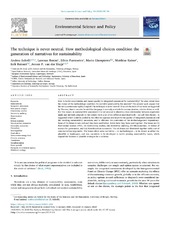| dc.contributor.author | Saltelli, Andrea | |
| dc.contributor.author | van der Sluijs, Jeroen P | |
| dc.contributor.author | Kaiser, Matthias | |
| dc.contributor.author | Reinert, Erik S. | |
| dc.contributor.author | Funtowicz, Silvio Oscar | |
| dc.contributor.author | Giampietro, Mario | |
| dc.contributor.author | Benini, Lorenzo | |
| dc.date.accessioned | 2020-04-20T12:46:29Z | |
| dc.date.available | 2020-04-20T12:46:29Z | |
| dc.date.issued | 2020-02-01 | |
| dc.Published | Saltelli A, van der Sluijs JP, Kaiser M, Reinert ES, Funtowicz S, Giampietro M, Benini L. The technique is never neutral. How methodological choices condition the generation of narratives for sustainability. Environmental Science and Policy. 2020;106:87-98 | eng |
| dc.identifier.issn | 1462-9011 | |
| dc.identifier.issn | 1873-6416 | |
| dc.identifier.uri | https://hdl.handle.net/1956/21941 | |
| dc.description.abstract | How to tackle uncertainties and ensure quality in integrated assessment for sustainability? To what extent does the choice of the methodology condition the narrative produced by the analysis? The present work argues that the two questions are tightly coupled. The technique is never neutral. If we are the tools of our tools, as suggested by Thoreau, then it can also be said that language is not only a vehicle for communication, it is the driver as well. For this reason, in sustainability assessment it is not unusual to discern a close relationship between arguments made and methods adopted. In the present work a set of six reflexive analytical tools – we call them lenses – is suggested which could be pooled to the effect to appraise and improve the quality of integrated assessment and the resulting sustainability narratives, and to alleviate the constraints of the method-argument dependency. None of the lenses is new and each has been used before. Never have they been used together. The lenses are (i) Post-normal science (PNS), (ii) Controversy studies, (iii) Sensitivity auditing, (iv) Bioeconomics, (v) Ethics of science for governance, and (vi) Non-Ricardian economics. The six lenses are illustrated together with a set of case/narratives/arguments. The lenses allow some narratives – or methodologies – to be shown as either implausible or inadequate, and new narratives to be developed to tackle pressing sustainability issues, which expand the horizon of possible strategies for a solution. | en_US |
| dc.language.iso | eng | eng |
| dc.publisher | Elsevier Ltd | eng |
| dc.rights | Attribution CC BY | eng |
| dc.rights.uri | https://creativecommons.org/licenses/by/4.0/ | eng |
| dc.subject | Sustainability | eng |
| dc.subject | Integrated assessment | eng |
| dc.subject | Post normal science | eng |
| dc.subject | Controversy studies | eng |
| dc.subject | Sensitivity auditing | eng |
| dc.subject | Bioeconomics | eng |
| dc.subject | Ethics | eng |
| dc.subject | Ethical matrices | eng |
| dc.subject | Non-ricardian economics | eng |
| dc.subject | Heterodox economics | eng |
| dc.subject | Honeybees | eng |
| dc.subject | Insectageddon | eng |
| dc.subject | Food ethics | eng |
| dc.subject | Nexus water-energy-food | eng |
| dc.subject | Circular economy | eng |
| dc.subject | Transitions | eng |
| dc.subject | Decarbonization | eng |
| dc.subject | Green growth | eng |
| dc.subject | European environment agency | eng |
| dc.subject | Relational ecology | eng |
| dc.title | The technique is never neutral. How methodological choices condition the generation of narratives for sustainability | eng |
| dc.type | Journal article | eng |
| dc.type | Peer reviewed | eng |
| dc.date.updated | 2020-02-03T16:10:03Z | |
| dc.description.version | publishedVersion | |
| dc.rights.holder | Copyright 2020 The Author(s) | eng |
| dc.identifier.doi | https://doi.org/10.1016/j.envsci.2020.01.008 | |
| dc.identifier.cristin | 1790431 | |
| dc.source.journal | Environmental Science and Policy | |

